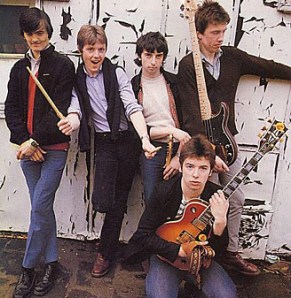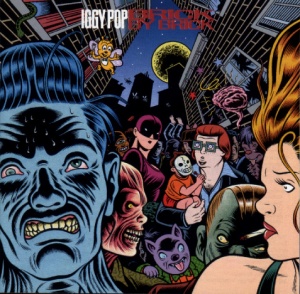In 1976 The Ramones played songs so fast they only lasted a couple minutes. Songs about sniffing glue, male prostitution and the joys of being different. But these were meant to be pop songs. They were punks.
In 1969 Iggy Pop rolled around in glass and flew across the stage topless in a dog collar and sequined gloves. He sang, or shouted, self-deprecating lyrics about life on the fringe of society. He was a punk.
In 1958 Eddie Cochran told you that music and dancing is more important than keeping in your parents’ good book. He was a punk.
Sometime in the 90s Gisele did a shoot wearing a Sid Vicious t-shirt. But she’s not a punk.
However, this tiny example does show the enormous effect that such an arguably small movement has had on popular, and unpopular, culture across the world. Not only in the music we hear today, from indie to dubstep via heavy metal, hip-hop and reggae, but in the films we watch, books we read and the clothes we wear. From Topshop windows to spotty teens’ bedrooms where some people still rip up tops with safety pins (I’m one of them). It’s in our politics, in the words we use, the pictures we see, the products we buy; it’s on the TV, the internet and painted on the walls of our towns. All around the globe people are turning to punk as a way of making a statement, from pseudo-genre Taqwacore to Russian rascals Pussy Riot. 30 years after this music was made kids are still walking down the street listening to ‘London Calling’ on their phones.
Punk-proper came around in 1975/76 and was arguably dead by 1980. People can, do and will continue to debate whether punk is dead, evolved, or still kicking. But this can’t be answered ‘yes’ or ‘no’; because punk is more than one particular look, one particular sound, or one particular attitude. Through all the white riots, black flags and green mohawks, I think one overriding principle remains -the principle that drove bands and poets and artists from Fulham pubs to Shea Stadium. The principle that whoever you are, wherever you are, you can do what you wanna do. You don’t have to have a classical education to express yourself nor must you follow society’s expectations. I think that the true lesson, and legacy, of punk is that having what Calvin Johnson calls ‘that beautiful teenage spirit’ is all that’s required to start a band, or a record label, or fashion label, or be a painter, or designer, or anything you wanna achieve. You don’t have to dress, or dance, or talk, or smell a certain way to be cool and happy; you can decide that for yourself. Punk happened in the seventies because for years people like Iggy Pop, Jonathan Richman and Lou Reed had been following this principle. And their style was called ‘underground’ because it strayed from the mainstream. But people had had enough of being pushed underground. So The Ramones, The Clash, the Sex Pistols, Television, John Cooper Clarke, Patti Smith and countless others got all in your face about it, shouting ‘yeah we’re different, and we like it!’
And music and culture exploded. The rules were gone to the land of lost morals. To be in a band now you didn’t have to fit a stereotype, you didn’t even have to be good (as some punk bands showed us). Songs challenged the establishment (God Save the Queen), and even their own labels (EMI), and some bands did away with record labels entirely (Crass, Buzzcocks). This isn’t to say music and culture got complete freedom. Record labels still try to cram their radio friendly garbage down our throats, maybe more so now than ever. But the effects of punk are undeniable. Without it Lady Gaga, Russell Brand and Nicki Minaj would be in the gutter, rather than LA mansions. So to give this some sort of meaningful or sentimental conclusion, in the mid-seventies – everything changed.
But it didn’t just happen out of nothing – nothing really does. Punk took it’s time developing, through art-rock, garage bands, British invasion, psychadelia and even good old Rock ‘n’ Roll. Some even argue that punk is the culmination of all post-war youth culture – either its logical conclusion or when it all went wrong. All the fads, fashions and styles before it; mods, rockers, skinheads, even hippies; fed into punk, and everything afterwards; new wave, grunge, Goth, emo; owes debt to it.
But there are particular people and bands that standout, people such as Iggy Pop, Link Wray, David Bowie, Third World War, Lou Reed & Andy Warhol, Death, the New York Dolls, the Seeds, John Waters & Divine, Jim Morrison, Jayne County and Eddie Cochran. Each of these, and so many others, can in their own way be called ‘Protopunk’. And this is the focus of my blog. Protopunk, the diverse attitude/genre/ethos that developed for potentially two decades (or even more) to start the big bang we call punk. Many, and still not enough, have added to the annals of punk history and tried to explain Protopunk. But this is no easy task considering the diversity of styles and sounds going into and coming out of Punk.
However, I now propose that I can compile the definitive Protopunk discography. This discography will be a chronology of every important record, recording and bootleg that traces the story of how this complex and confrontational idea(s) emerged. I also aim to bring in the art, fashion, theatre, film, literature, poetry and politics that influenced those influential people. Updated regularly with additions and corrections as I trawl through piles of books, magazines, newspapers, websites, LPs, CDs, Tapes, liner notes and whatever I can find, on my metaphorical hands and knees (with great pleasure).
But that ain’t all. Every (or almost every) day will be an update of ‘On This Day in Punk History’. And expect news and reviews on gigs and releases. My regular blog updates will not only reveal what I’ve discovered in my garbage quest but offer my opinions on the music, art and culture for all who care/dare to hear them. And please – this cannot be done without your opinions too. Comment and criticise everything I add to make sure this is truly the ultimate discography.
Rebellious Jukebox will mine the rich history of Protopunk and in its own irreverent way, pay respect to the people behind it. Because Aerosmith, Genesis and ABBA are shit. These are the songs that saved your life, and how they came to be.
Oi! Oi! Oi!

